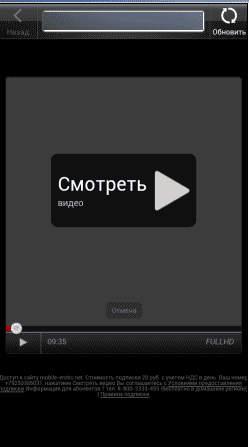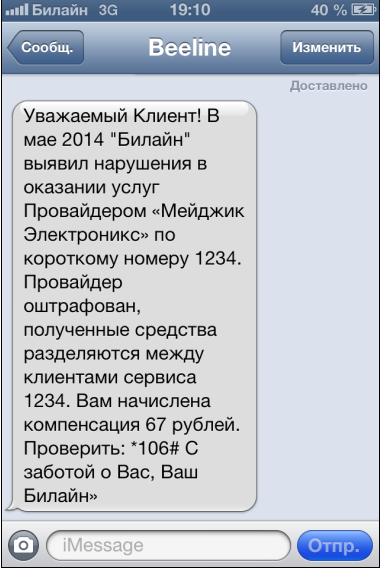Paid subscriptions and paid content services of mobile operators

Another operator: after clicking on this button during mobile surfing you will be signed up for a paid service.
The system itself was originally invented perfectly: pay with one action anything on the Internet, or with one SMS - anything outside the network. But quite quickly, these unscrupulous companies “hooked” on these paid subscriptions, whose activities can be classified as fraud.
Given the more than substantial operator’s commission, there are two ways to go:
- Create an ecosystem that allows abuse and generates profit.
- Or do the opposite, and lose money.
Currently, Beeline earns on fees for paid subscriptions about 10 times less than other operators of the Big Three - you can check my words in a few months, when the financial indicators of all companies will be open. Now we practically do not earn on subscriptions and continue to reduce the turnover on this channel.
Since February 2014, we have greatly thinned the ranks of content providers thanks to your help, data analysis and investigations of our security service. For two months, we returned 30.2 million rubles to subscribers' accounts and in addition transferred the fines received from content providers as moral compensation to those who suffered from dishonest charges.
Informing subscribers
On May 1, 2014, Federal Law of July 23, 2013 N 229-ФЗ “On Amendments to the Federal Law“ On Communications ”, which requires a new content service scheme from operators, entered into force. In particular, a mandatory indication of the cost of the service before they are activated.
In the summer of 2013, we began work on a whole range of measures:
1. In October, subscriptions activated on the mobile Internet on modems and tablets were banned.
The fact is that this form of subscription involves clicking on the button on the site as an acceptance and receiving SMS with what exactly and how it is connected. It’s not always possible to read this SMS on a modem and tablet, and it’s far from always obvious to subscribers that when they click something on the computer, they interact with the balance of their phone.
2.In November, we began to always indicate the cost of the service on the button itself, introduced standards for its appearance.
Here is one of our buttons, where the fulfillment of our requirements is already “on the edge”:


But this may look like the button of another operator. Pay attention to how well it disguises itself as a button on a standard player:

The law is formally fulfilled - the conditions are written in finely light gray on white. You do not see them the first time.
3. From December 25, for all services from 100 rubles, we have entered an additional confirmation by SMS.
That is, connecting something by accident or insufficiently consciously became very, very problematic.
4. From January 16, all SMS-subscriptions, regardless of the amount received such confirmation.
Here is the format of our message:

And here is the format of another operator. Find 3 differences:

5. Then we introduced the following procedures:
- To the existing SMS before activation and SMS informing about the action and methods of disconnecting, we added a monthly SMS about connected services and how to disable them.
- We limited the term of any subscription, to a maximum of 5 months, after which we send an SMS with a request to confirm the renewal, and if the subscriber does not do anything, it is forcibly disconnected.
- Blocked the possibility of default provider services on the plans for "First Child", "Veteran" and "Mobile Senior Citizen".
6. Since February, a rule has been introduced that the fine collected from the content provider is distributed among all subscribers affected by its actions.
For example, if you were charged 50 rubles because of fraud, we will return these funds to you, plus you will receive 50-200 rubles a share from a fine from this provider (though not immediately, but 1-2 months after it’s fine).
Here are the SMS you will receive:

7. Began to make refunds without appeal.
Thanks to the new rules for working with content providers, in the case of fraud, our security guards checked all payments by this short number, and we made a refund, regardless of whether the subscriber complained or not.
8. With the help of our data analysis department, we went through all the providers and their sites, as well as highlighted profiles of obviously “bad” use of the subscription.
Well, for example, when subscribers make multiple attempts to send SMS to different short numbers within a few seconds (a virus or malware apparently worked here). Ultimately, this led to severe fines for many content market players.
9. Considering that a rather serious share of the write-offs came from Android viruses that can send SMS and send reply SMS with confirmation of a subscription, they launched a free antivirus for this platform.
It automatically updates the anti-virus database. Set and forget - the smartphone or tablet is protected.
Note that, by law, we were absolutely not obliged to do this, and could continue to earn on “accidentally attached” subscriptions. Nevertheless, we want to set standards for fair play in this market, because, again, the payment method itself can be very convenient in the future.
Appeals
One of the most painful places is the inaccuracy of the reported data. As a rule, from 200-250 contacting subscribers, only one person can give an accurate picture, sufficient for instant understanding that this is a real fraud, and response.
The first problem is that the actions of scammers are extremely unobvious for a regular subscriber. For example, there was voice spam with IVR in the spirit: “You got a voice card, do something to get it.” The victim did as said, but received a subscription instead of a postcard. To understand what is happening to put it mildly, far from a voluntary subscription to a service, I had to spend quite a lot of time. But in the end, the source of the fraud was found.
The second problem is that many subscriptions belong to the 18+ group, and people are simply embarrassed to indicate with sufficient accuracy where and how they “picked them up”.
The third problem is that subscribers are not always technically competent to understand what happened.
Return
During this time, we returned 30.2 million rubles to subscribers. Presumably, over the next period, we will return about 4 times less, since the most striking violators left the market or realized that we were playing seriously and for a long time it would be better not to contact us.
Procedure
After receiving the claim, a refund is made directly during a call to the contact center or within a couple of days after the appeal, if a more detailed check is required.
When there is no application, and the data came from our monitoring system, each case is analyzed, and all victims are identified, it can take about a month - there are legal difficulties that cannot be automated. After we install all the affected subscribers, we make a refund.
Fair play
Our position is this: we are for fair play. The actions of operators who formally and minimally comply with the requirements of the law, but at the same time striving to increase the turnover of their paid subscriptions, we find unethical. For our part, we (it should be noted, with difficulty) refused a substantial part of the profit in favor of an honest relationship with the subscriber. We plan to compensate for these and other similar aspects of lost profits by increasing the subscriber base in the future. We still have work to do in many areas. We do it in places slowly, but we do. And we are for fair play.
